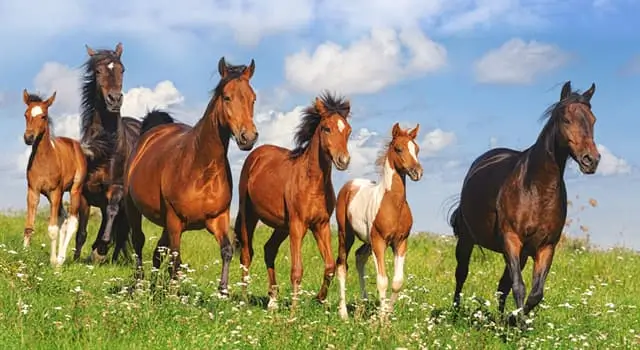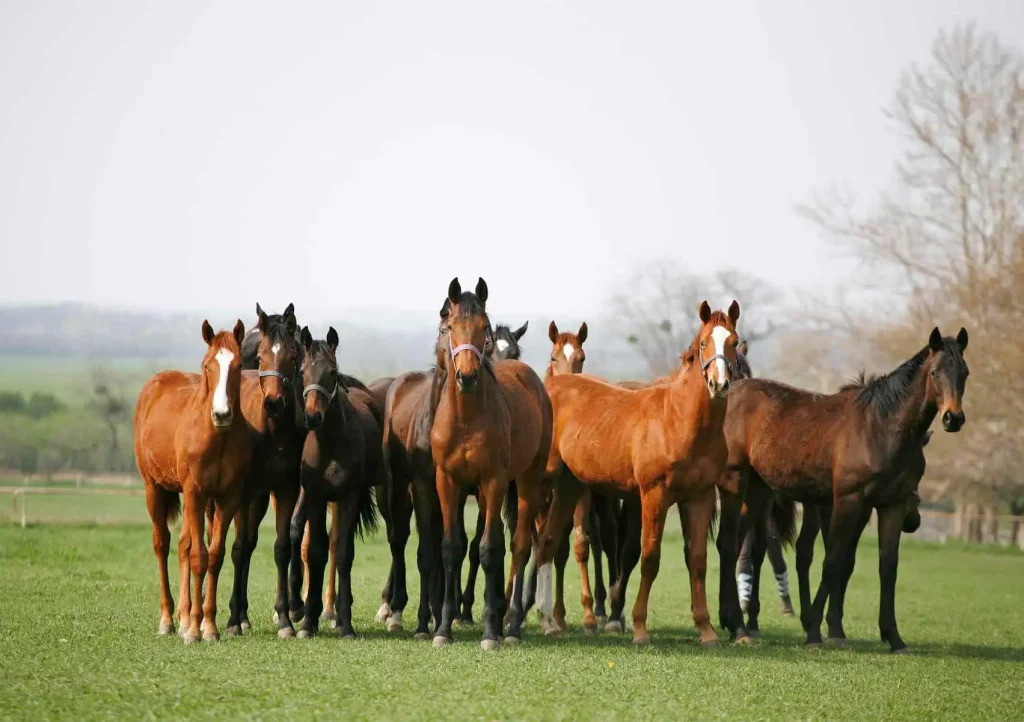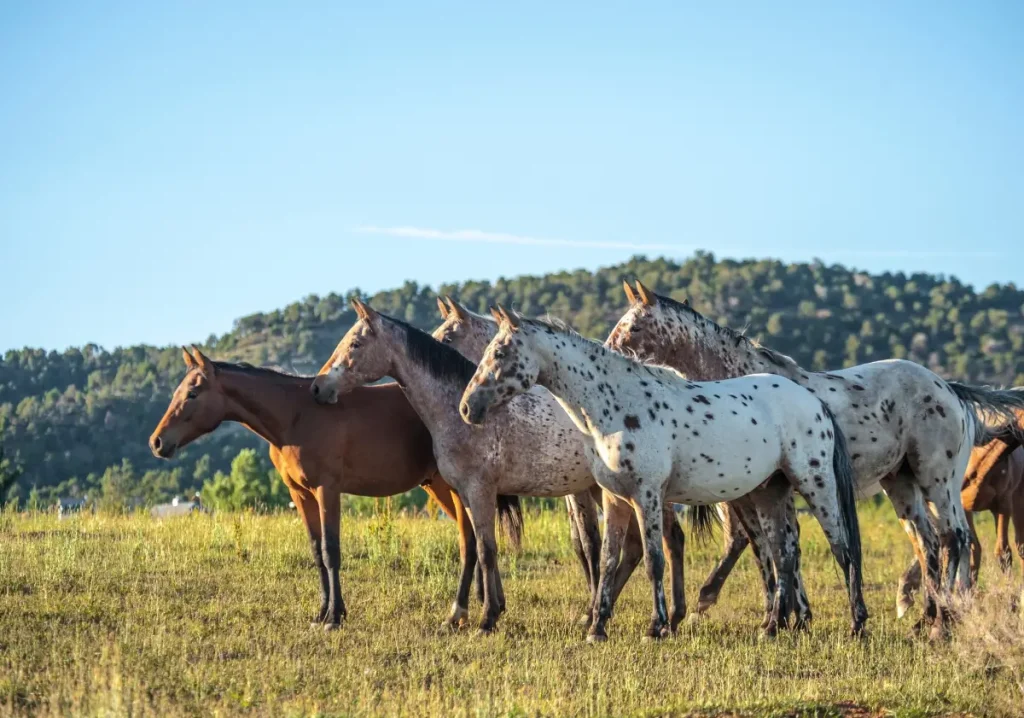What Is a Group of Horses Called?
The first time I learned about horses before, my question was, what do you call a bunch of horses? The answer is a herd. However, there is much more to horse herd names and what they actually mean.
Every horse lover should be educated about horse herds. They’re a critical part of a horse’s life. In this article, we are going to cover horse herds, what they are up to, and the special names for horse herds.
In this article, we will be drawing on research from the book “The Behaviour of Horses” by Dr Jane Smith. We will also consider the American Horse Council “Equine Sociability.”
My goal in: to bring a new perspective on horses to you.
Key Takeaways
- The term for a group of horses is a herd.
- Herds are essential for learning about horse social behaviors.
- Words to describe horses in groups suggest their social organization.
- Horse herd names reveal their social behaviour.
- Here we explore the importance of horse herds further.

Understanding Horse Herds
Horses are normally social animals that used to be living within a group of equine herds. These groups are essential for all horses. These help horses to be dears and become pals.
Herds also protect and boost the mood of a horse. They can grow and excel here.
Herds Matter in the World of Horses
Every herd of horses has a leader. This individual assists the quorum in obtaining sustenance and relocation. This helps maintain a calm and happy herd.
Horses also engage in play and grooming behaviours. That helps them to bond better. It helps him feel connected to them.
How Horse Herd Dynamics Show Up
How a whole, or a herd, of horses functions influences how an individual horse feels, and thus, their health. A horse can be disrupted by losing a friend.
However, in a group, horses fare well. They keep an eye on each other for illness. This will get them to be good and good.
What Do You Call a Group of Horses
It is fascinating, though, to think about what we call a group of horses. Horse group Names (FYI: There are many names depending on the amount of horses grouped together).
Each name bears its own significance and historical significance. These names show what a horse is like AND how they get along! Very interesting…and cool to learn!
Common Terms for Horse Groups
But when it comes to horseys and all the groups of them, a few names do ring out:
- Herd: This name is the most common. It denotes a collection of horses that resides with one another.
- Team: This is for a work horse. It demonstrates their collaborative efforts in pulling or lifting and moving things.
- String: This is the term used for horse owners. The term refers to a band of horses kept together for riding or for sale.
The Meaning Behind the Names
Horse groups provide vivid name clues about their social life. A herd is an example of how horses naturally bond and follow. Focus on horses In action as the term team emphasizes on how these horse team up to complete work.
As the string of horses indicates, a group of horses can be quite a little organization, each with a job to do.

Different Types of Horse Herds
Horse herds are cool to follow up his data. They can be wild or domestic. There are wild horse herds that fall under each of these types. This is influenced by their location and their community.
Wild vs. Domestic Herds
Wild horses run free in wide open spaces. They act naturally, and they stay in a pack. Domestic horses, on the other hand, share their lives with people. It changes the way they behave and communicate.
Characteristics of Each Type
Wild horses are resilient creatures. They find food on their own. They also have good relationships with one another, as well as leaders — and it follows the same process, based on age and size.
Domestic horses are the exception. For pleasure, competition, or utilitarian use. How they behave is based on training and upbringing.
| Aspect | Wild Horse Herds | Domestic Horse Groups |
|---|---|---|
| Social Structure | Natural hierarchy based on age and strength | Influenced by human management and training |
| Size | Typically larger, ranging from 10 to 30 members | Vary widely, from small groups to larger stables |
| Behavioral Traits | Instinctual and survival-driven | Can be trained, may display learned behaviors |
| Environmental Factors | Adapted to harsh, open environments | Managed environments, often domesticated settings |
Collective Nouns for Horses
Delving into the land of horsedom introduces us to a host of collective terminology. These words, horse group terminology, are specific to location and cultural background.
The name for a group of horses is not just a label. It showcases the unique behaviour and social habits of these lovely creatures.
Exploring Horse Group Terminology
Something that is uniquely specialized in this horse group term are names that reflect the special feature. For instance, a “herd” is a term for a number of horses.
However, terms like team or string may be found in different situations. They demonstrate the role of the horses in this bunch. Some of the examples of collective nouns are:
- Herd: Because of their social structure, a common term used for a group of horses.
- Team: For when horses join forces, be it in pulling or being ridden.
- String: Generally denotes a stable of horses owned by a specific individual, especially in the context of horse racing.
Unique Names Based on Traits
Special names can also be inspired by the traits of horses. As an example of this, you are more familiar with strength with a draft horse.
These horses have the world-famous Thoroughbred speed and agility. These collective nouns give us a clue to what makes these horses special and what role they serve. A look at some examples of unique names related to horse characteristics:
| Collective Noun | Traits Associated |
|---|---|
| Band | Feral horse groups, usually with a stallion and his mares. |
| Gaggle | Used humorously for a very unruly group of horses, showing chaos. |
| Mob | A big group of wild horses, showing strong herd behavior. |
Horse group terminology along with the special terms for certain traits that we can use lets us find a way to appreciate these great animals even more. It shows their various ways of being social.
The Role of the Herd in Horse Society
Horse society revolves around the herd. It gets to the core of their existence and quality of life. It helps us to identify what each member of the hierarchy does, knowing that there are different social hierarchies in horses.
One of those areas is herd communication, which allows us a glimpse into their remarkably complex social states. It represents the significance of living in a community.
Social Hierarchies and Roles
Social hierarchies do develop in a horse herd. They orchestrate what is fed and who breeds first. There is a spot in the order for each horse—from the leader to the followers.
This order maintains stability and allows horses to thrive. Age and strength and temperament adjust roles. This makes the group dynamic.
Communication Within the Herd
Being able to communicate with one another is key to a herd. Horses talk, although they dont have voices, which means Horses communicate using sound and body language. If they whinny or nicker, then they are angry or need help.
But postures of strength show who is boss. These signals include the way a horse looks, moves and behaves. And this makes them more resilient and adaptive.
Herd Size and Composition
Horse enthusiasts should also know herd size and composition are critical. Herd size can depend on a number of things including the environment and how horses get along with each other. Vital to their health and happiness is a balanced place to live that is healthy for the herd.
Factors Influencing Herd Size
There are several reasons that can affect the size of a horses herd. These include:
- You need sufficient food, water, and shelter. In areas where resources are scarce, a large herd might not be realistic.
- Natural Order in a Herd: this can determine how many horses can live together. Leaders can block followers from appearing.
- Breeding/culling: Horses are bred within domestic situations and thus are able to change herd size. The size of the groups depends, for the most part, on the aims of the owners.
Diversity Within Horse Groups
A horse group with variety has lower turnover and is more resilient. Diversity of horses in the group is critical for herd success. These are the advantages of diversity:
- Increased Resilience: Varied herds are more capable of managing shifts or adversity.
- Increased Social Learning: Usually other horses offer up some life experience in this new group situation.
- Less Stress: A herd with different personalities can reduce stress and in fighting.
| Factor | Impact on Herd Size | Effect on Horse Group Diversity |
|---|---|---|
| Resource Availability | Limits herd size based on region | Encourages adaptation based on resources |
| Social Structure | Defines hierarchy and size | Affects interactions and relationships within the group |
| Breeding Practices | Influences the number of offspring | Shapes genetic diversity within the herd |

Famous Herds and Their Names
Famous Hundreds of horses appear in history and literature These stories highlight the unique human-animal bond between people and horses. And they share stories about how their journeys resonate with us as time goes by.
A good example of this are the mustangs from the American West. They symbolize independence and power. Their tales are emblematic of the American spirit.
Iconic Horse Herds in History
Horse herd names can often tell you a little story. Wild Mustangs are an icon of natural beauty and a piece of American history. They have resulted in advocacy for laws to protect them.
Another well-known breed: The Cam-argue Horses of France. They are recognized for their white coats and aid in herding. They own the charisma of ancient techno.
Horse Packs In Literature
Herds of horses have been praised as well in the pages of books. They discuss friendship and freedom. In Anna Sewell’s Black Beauty, horses smile and say “Now, do you see how kind and respectful we are? What are you going to do about it?
Walter Farley: The Bond Between Man and Horse: ‘The Black Stallion’ Series You feel the importance of these stories.
Role of Environment on Herd Mentality
A neat link comes when you look into the environmental influence on horses. The living arrangements of horses change their social lives. Even different places — green fields versus dry deserts — shape how they co-exist.
The Effect Of Habitat On Herd Composition
Horse herds vary exceedingly by location. Groups are larger in green fields because there is lots of food. It also makes them feel safe and allows them to remain together for an extended period of time.
Where conditions are harsh- for example, in deserts- groups are smaller. Horses are … These grazers need to go a long way to find food.
The Evolution of Its Herds
The evolution of some horse herd adaptations indicates the degree to which they have become different over the years. Herds adapt; they learn different approaches to protecting themselves and gaining nourishment. They flock together more, for instance in places where predators are nearby.
They also become better at communicating between themselves. They get conditioned to lookout for either danger or food.
| Habitat Type | Herd Size | Behavioral Adaptations |
|---|---|---|
| Grasslands | Large | Stable social structures, cooperative foraging |
| Forests | Medium | More cautious, use of cover for safety |
| Deserts | Small | Fluid movement, greater reliance on group vigilance |
| Mountains | Variable | Adapt tactics based on terrain, agile movements |
This goes to show just how incredibly well horse herds can adapt to their environment! Understanding how the effect of environment on herd behaviour improves our understanding of their social lives is extremely important.
Caring for Horse Herds
This means caring for horse herds and knowing what needs to be done. Keeping a horse happy and healthy is paramount as an owner. Quality nutrition, medical attention, and recreational events are essential.
Horse Owner: Top Tips
Herd management methods ensure a thriving horse herd. Here are some key practices:
- Feeding: Each horse should be fed appropriate feed to keep him or her healthy and happy.
- Veterinary Care: Routine check-ups and vaccinations help prevent illness in the herd.
- PLENTY OF ROOM: Sufficient space allows horses to move and socialize, which helps minimize stress.
- Enrichment: Fun Activities + Nature to Keep Horse Minds Busy
The Need of Socialization
Spending time with other horses is important for the mental well-being of horses. Horses are social animals. Here’s why it’s important:
- Horse-Friendly Interactions: Positive contact with friends decreases anxiety.
- Working on social behaviour: Horses who learn the ropes of communication and rules are happier horses.
- Better Behaviour: Horses that socialize are much easier to train and deal with because they understand hierarchy.
Conclusion
We have found out what a group of horses is called. A world of quirky horse groups and their fascinating dynamics. Understanding herd dynamics in horses helps understand the horse.Each horse of a herd is a valuable one. They maintain the cheer in the group and ensure balance in the group. If we can learn more about these bonds we can create better homes for horses.Learning this is what helps us align with horses. It also demonstrates an acknowledgement of their emotions and needs. And that’s the secret to caring for horses like a kind and smart person.






